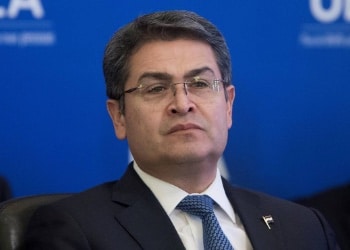Honduras President Juan Orlando Hernández once again stole the limelight in a major drug trafficking trial in the United States, raising serious doubts about future cooperation between the countries.
An explosive first week in the trial of suspected Honduran trafficker Geovanny Fuentes Ramírez, which began March 8 in New York, provided damning testimony alleging that President Hernández received bribes from drug traffickers, but in a more direct fashion than perhaps even the president himself expected.
From the outset, federal prosecutors reeled off a litany of accusations against President Hernández, including that he took a $25,000 bribe from the defendant in exchange for providing political and legal protection for drug trafficking operations.
As part of this arrangement, Hernández — an unindicted co-conspirator in the case — would have gained access to a “cocaine factory” capable of producing hundreds of kilos of cocaine a month, prosecutors alleged.
Prosecutors also claimed that Hernández, who commonly goes by his initials JOH, had instructed Fuentes Ramírez to work with his brother, Juan Antonio “Tony” Hernández, who was convicted on drug trafficking charges in New York in October 2019.
SEE ALSO: US Senators Seek Sanctions Against Honduras President
The witness testimony that followed included a familiar face: Honduran drug trafficker Devis Leonel Rivera Maradiaga, the former head of the Cachiros cartel who in 2019 had testified in the trial of Tony Hernández. During questioning on March 11, Rivera claimed that Fuentes Ramírez had paid two bribes to President Hernández in exchange for protection from arrest in Honduras.
Rivera also implicated Hernández’s family members and allies. He said the Cachiros paid a $250,000 cash bribe to the president’s sister, Hilda Hernández, when he was a presidential candidate in 2012, in exchange for “protection so that we would not be arrested in Honduras” and “for my brother and I not to be extradited to the United States.”
As part of the deal, Hernández would also provide the Cachiros state contracts that they used to launder drug money, Rivera said.
The Cachiros also paid a $500,000 bribe in 2012 to current Honduras vice-president and then-presidential candidate, Ricardo Álvarez, again to secure protection from arrest and state contracts, Rivera testified.
“Álvarez promised that he was going to abolish the extradition law between Honduras and the United States,” Rivera said.
Álvarez immediately denied the accusations in a statement on Twitter.
Prior to Rivera’s testimony, the prosecution displayed photos of President Hernández smiling with the son and brother of Fuentes Ramírez. The photos were found on Fuentes Ramírez’s cellphone, taken by police at the time of his arrest.
A phone number and email address for Hernández were also discovered on the phone, though no direct communications were detected between the two men, an expert witness from the Drug Enforcement Administration (DEA) testified.
President Hernández has repeatedly denied any connection to drug trafficking, claiming the allegations are based on the testimonies of convicted criminals seeking a “magic key” to reduce their sentences — an accusation he repeated on Twitter on the trial’s opening day.
Just weeks before the trial, a group of US senators proposed a bill to sanction the Honduran president on grounds of corruption and human rights abuses.
InSight Crime Analysis
The US Justice Department has alleged in numerous court documents that President Hernández received millions of dollars in bribes to protect drug traffickers. But now he is also under fire from US State Department and Congressional officials after the latest accusations in open court.
The Trump administration saw in Honduras a key ally in the fight against organized crime — important enough to share sensitive counter-narcotics intelligence. The Trump White House and State Department kept Hernández in the fold, for example, even after he was named a co-conspirator in his brother’s 2019 drug trial.
But the new administration of President Joe Biden and the mounting allegations against Hernández by federal prosecutors have opened the door for the State Department and Congress to take a much firmer stance toward the Honduran president.
“It seems that the US Government has decided that its relationship with JOH is untenable,” a former senior State Department official told InSight Crime on the condition of anonymity because he was not authorized to speak on the matter.
Recent statements by National Security Council official Juan Gonzalez and his Obama-era counterpart Dan Restrepo “make clear that the United States has decided it won’t deal with Central American leaders who are accused of gross acts of corruption,” the official said.
SEE ALSO: One Party, Many Crimes: The Case of Honduras’ National Party
Those sentiments were echoed by longtime State Department official and current Southern Border Ambassador Roberta Jacobson. When asked about the drug allegations against President Hernández in a White House press briefing on March 10, she said that no funds from a proposed $4 billion assistance package for Central America would be handed over to government leaders.
Rep. Norma Torres, a California Democrat, was far blunter: “Keep your cocaine and lies about fighting the corruption you wallow in for someone dumb enough to believe them,” she said in a tweet during the trial.
Sen. Patrick Leahy, a Vermont Democrat who was among a group of senators that signed the bill to sanction Hernández, also issued a press release during the trial, saying “the Biden Administration and the US Congress should reassess our relations with (Central American) governments that are the antithesis of credible partners.”
The Biden administration, however, may be loath to completely torpedo its relationship with President Hernández, which the embattled president seems to be relying on.
Hernandez threatened to break ties with the United States at the start of the trial, saying in a tweet that Honduras’ international anti-narcotics cooperation would collapse if US authorities continue to believe “false testimony” from drug traffickers. Honduras, one of the most important transit points in Latin America for cocaine bound for the US, has long worked with the United States to combat drug trafficking in Central America.

